Ethical Dilemma in Healthcare: Patient Rights and Ethical Theories
VerifiedAdded on 2020/05/16
|9
|1840
|288
Essay
AI Summary
This essay delves into an ethical dilemma in healthcare, specifically addressing the challenge of patient information sharing in a palliative cancer care setting. The case study involves a middle-aged female patient diagnosed with gastric carcinoma, whose family requests that she not be informed of her terminal prognosis due to her fear of cancer. The essay explores the ethical principles of autonomy, non-maleficence, and beneficence, analyzing the rights and perspectives of the patient, family, and healthcare professionals. It examines consequentialist and deontological ethical theories to determine the most appropriate course of action. The analysis highlights the conflict between respecting patient autonomy and the family's desire to protect the patient from emotional distress. The essay concludes by emphasizing the patient's right to know the truth, enabling her to make informed decisions and find peace, aligning with the principles of professional nursing ethics.
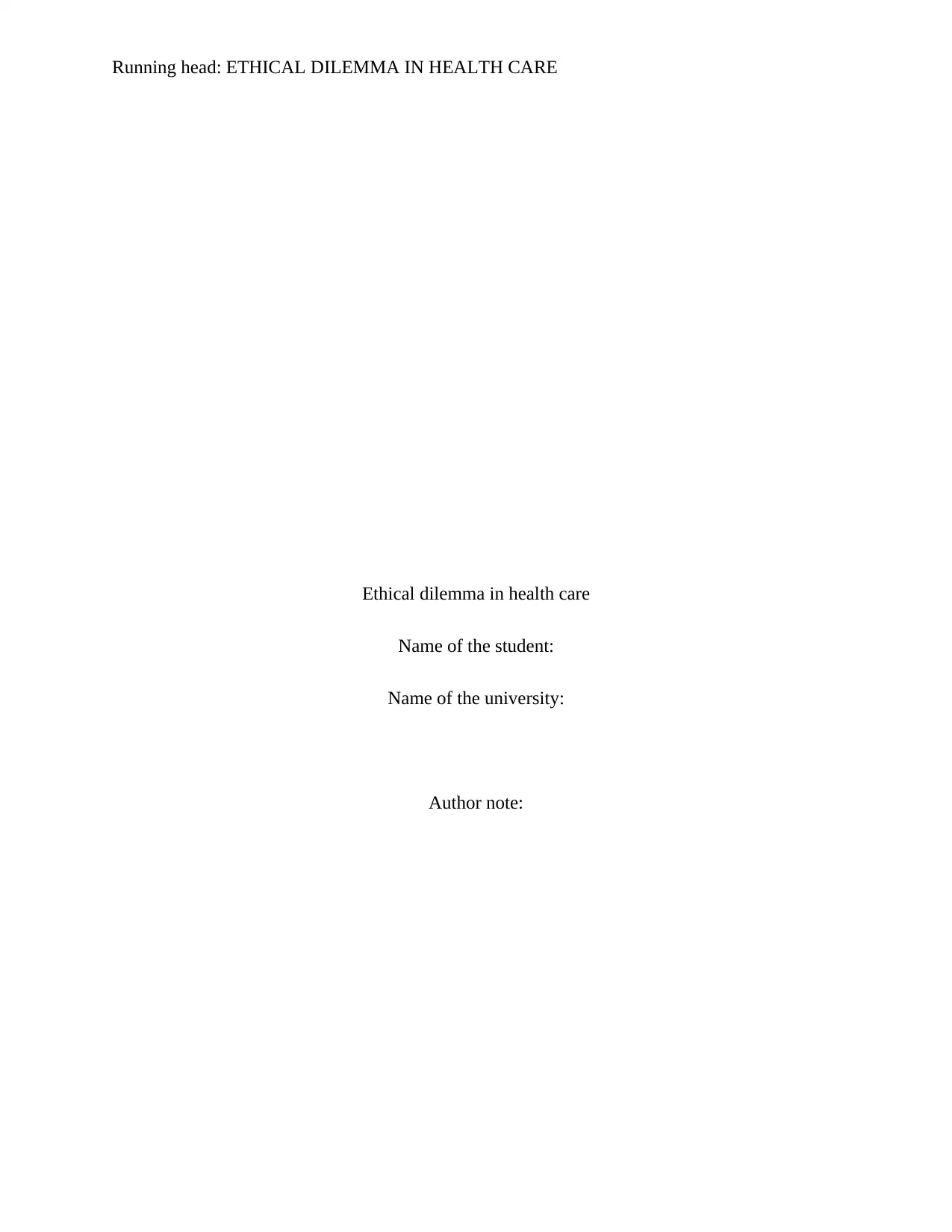
Running head: ETHICAL DILEMMA IN HEALTH CARE
Ethical dilemma in health care
Name of the student:
Name of the university:
Author note:
Ethical dilemma in health care
Name of the student:
Name of the university:
Author note:
Paraphrase This Document
Need a fresh take? Get an instant paraphrase of this document with our AI Paraphraser
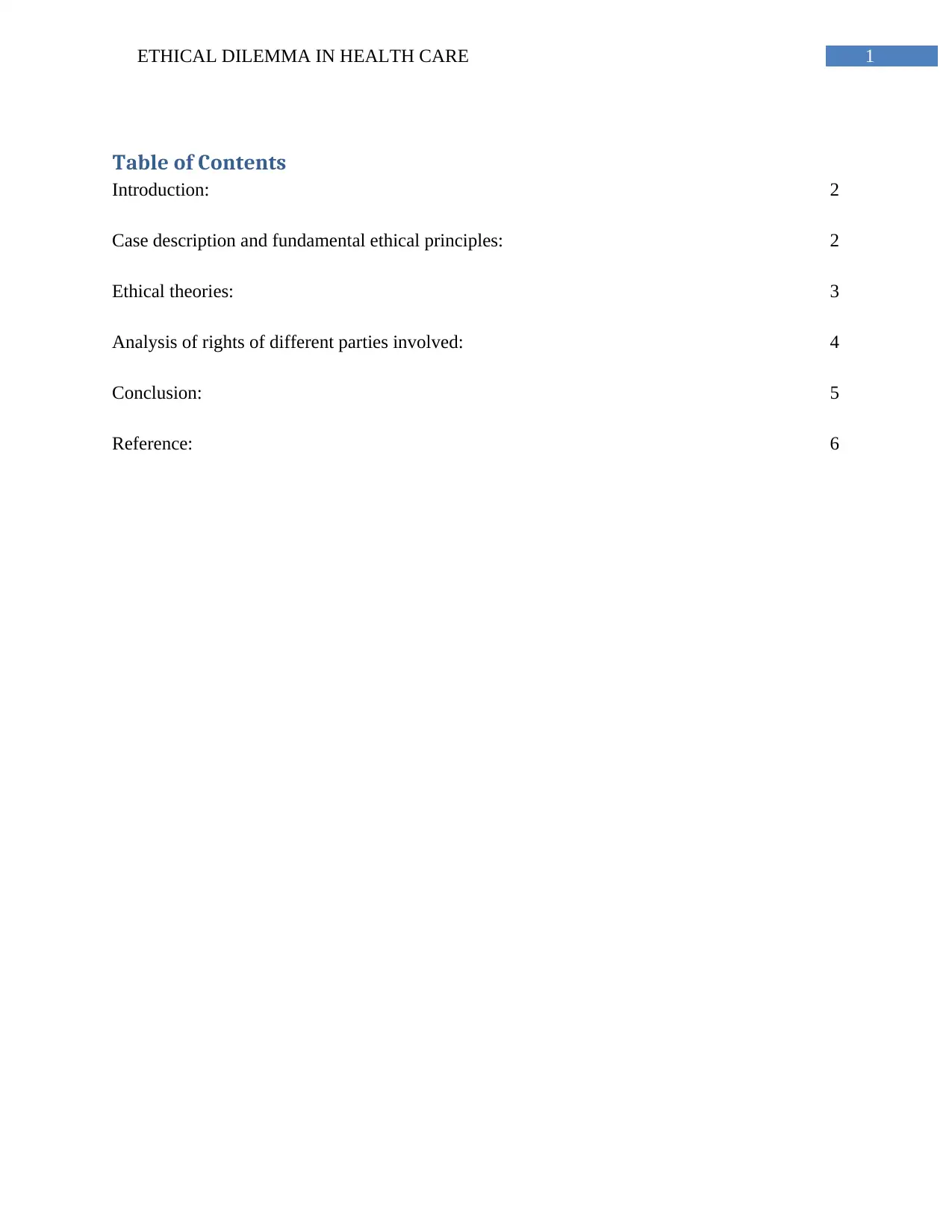
1ETHICAL DILEMMA IN HEALTH CARE
Table of Contents
Introduction: 2
Case description and fundamental ethical principles: 2
Ethical theories: 3
Analysis of rights of different parties involved: 4
Conclusion: 5
Reference: 6
Table of Contents
Introduction: 2
Case description and fundamental ethical principles: 2
Ethical theories: 3
Analysis of rights of different parties involved: 4
Conclusion: 5
Reference: 6
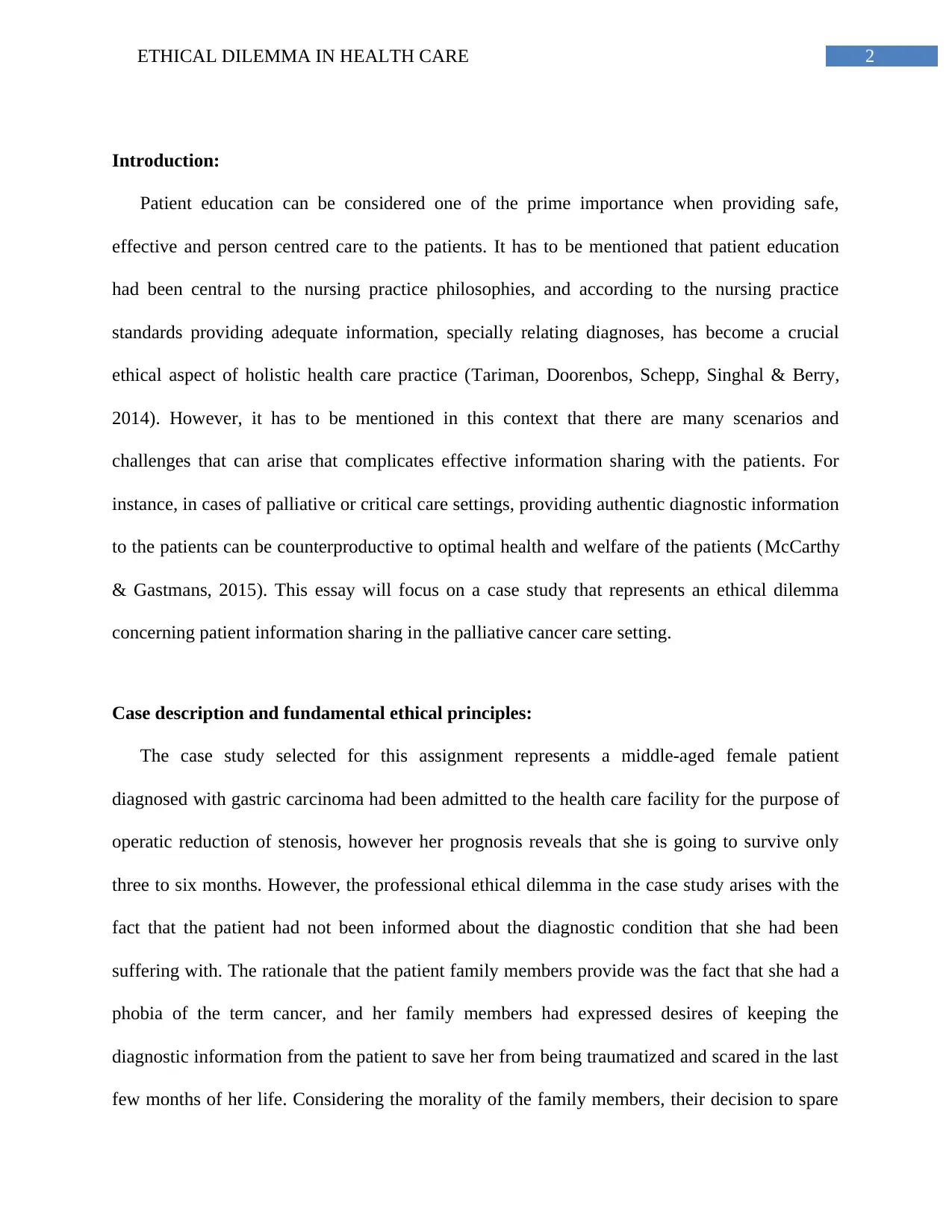
2ETHICAL DILEMMA IN HEALTH CARE
Introduction:
Patient education can be considered one of the prime importance when providing safe,
effective and person centred care to the patients. It has to be mentioned that patient education
had been central to the nursing practice philosophies, and according to the nursing practice
standards providing adequate information, specially relating diagnoses, has become a crucial
ethical aspect of holistic health care practice (Tariman, Doorenbos, Schepp, Singhal & Berry,
2014). However, it has to be mentioned in this context that there are many scenarios and
challenges that can arise that complicates effective information sharing with the patients. For
instance, in cases of palliative or critical care settings, providing authentic diagnostic information
to the patients can be counterproductive to optimal health and welfare of the patients (McCarthy
& Gastmans, 2015). This essay will focus on a case study that represents an ethical dilemma
concerning patient information sharing in the palliative cancer care setting.
Case description and fundamental ethical principles:
The case study selected for this assignment represents a middle-aged female patient
diagnosed with gastric carcinoma had been admitted to the health care facility for the purpose of
operatic reduction of stenosis, however her prognosis reveals that she is going to survive only
three to six months. However, the professional ethical dilemma in the case study arises with the
fact that the patient had not been informed about the diagnostic condition that she had been
suffering with. The rationale that the patient family members provide was the fact that she had a
phobia of the term cancer, and her family members had expressed desires of keeping the
diagnostic information from the patient to save her from being traumatized and scared in the last
few months of her life. Considering the morality of the family members, their decision to spare
Introduction:
Patient education can be considered one of the prime importance when providing safe,
effective and person centred care to the patients. It has to be mentioned that patient education
had been central to the nursing practice philosophies, and according to the nursing practice
standards providing adequate information, specially relating diagnoses, has become a crucial
ethical aspect of holistic health care practice (Tariman, Doorenbos, Schepp, Singhal & Berry,
2014). However, it has to be mentioned in this context that there are many scenarios and
challenges that can arise that complicates effective information sharing with the patients. For
instance, in cases of palliative or critical care settings, providing authentic diagnostic information
to the patients can be counterproductive to optimal health and welfare of the patients (McCarthy
& Gastmans, 2015). This essay will focus on a case study that represents an ethical dilemma
concerning patient information sharing in the palliative cancer care setting.
Case description and fundamental ethical principles:
The case study selected for this assignment represents a middle-aged female patient
diagnosed with gastric carcinoma had been admitted to the health care facility for the purpose of
operatic reduction of stenosis, however her prognosis reveals that she is going to survive only
three to six months. However, the professional ethical dilemma in the case study arises with the
fact that the patient had not been informed about the diagnostic condition that she had been
suffering with. The rationale that the patient family members provide was the fact that she had a
phobia of the term cancer, and her family members had expressed desires of keeping the
diagnostic information from the patient to save her from being traumatized and scared in the last
few months of her life. Considering the morality of the family members, their decision to spare
⊘ This is a preview!⊘
Do you want full access?
Subscribe today to unlock all pages.

Trusted by 1+ million students worldwide
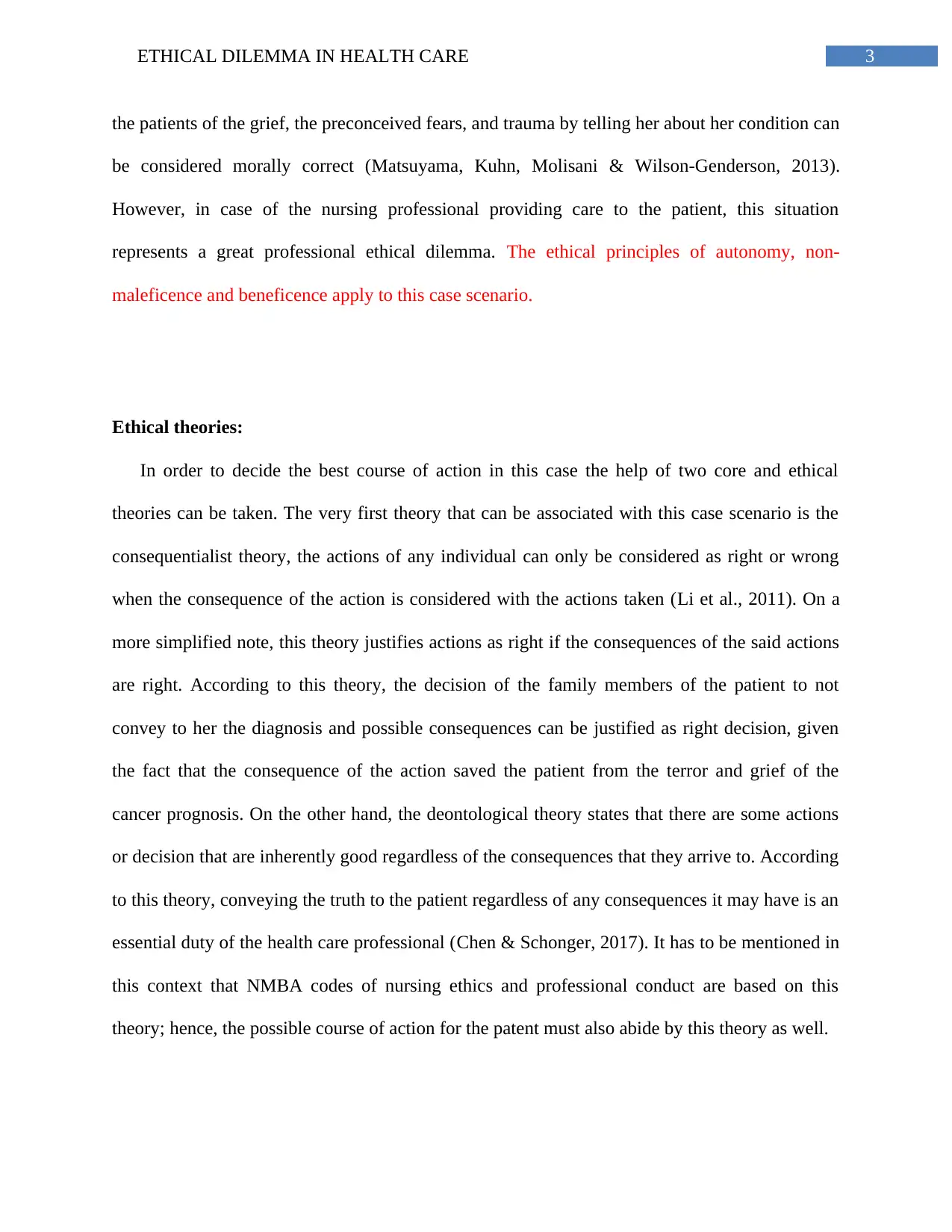
3ETHICAL DILEMMA IN HEALTH CARE
the patients of the grief, the preconceived fears, and trauma by telling her about her condition can
be considered morally correct (Matsuyama, Kuhn, Molisani & Wilson-Genderson, 2013).
However, in case of the nursing professional providing care to the patient, this situation
represents a great professional ethical dilemma. The ethical principles of autonomy, non-
maleficence and beneficence apply to this case scenario.
Ethical theories:
In order to decide the best course of action in this case the help of two core and ethical
theories can be taken. The very first theory that can be associated with this case scenario is the
consequentialist theory, the actions of any individual can only be considered as right or wrong
when the consequence of the action is considered with the actions taken (Li et al., 2011). On a
more simplified note, this theory justifies actions as right if the consequences of the said actions
are right. According to this theory, the decision of the family members of the patient to not
convey to her the diagnosis and possible consequences can be justified as right decision, given
the fact that the consequence of the action saved the patient from the terror and grief of the
cancer prognosis. On the other hand, the deontological theory states that there are some actions
or decision that are inherently good regardless of the consequences that they arrive to. According
to this theory, conveying the truth to the patient regardless of any consequences it may have is an
essential duty of the health care professional (Chen & Schonger, 2017). It has to be mentioned in
this context that NMBA codes of nursing ethics and professional conduct are based on this
theory; hence, the possible course of action for the patent must also abide by this theory as well.
the patients of the grief, the preconceived fears, and trauma by telling her about her condition can
be considered morally correct (Matsuyama, Kuhn, Molisani & Wilson-Genderson, 2013).
However, in case of the nursing professional providing care to the patient, this situation
represents a great professional ethical dilemma. The ethical principles of autonomy, non-
maleficence and beneficence apply to this case scenario.
Ethical theories:
In order to decide the best course of action in this case the help of two core and ethical
theories can be taken. The very first theory that can be associated with this case scenario is the
consequentialist theory, the actions of any individual can only be considered as right or wrong
when the consequence of the action is considered with the actions taken (Li et al., 2011). On a
more simplified note, this theory justifies actions as right if the consequences of the said actions
are right. According to this theory, the decision of the family members of the patient to not
convey to her the diagnosis and possible consequences can be justified as right decision, given
the fact that the consequence of the action saved the patient from the terror and grief of the
cancer prognosis. On the other hand, the deontological theory states that there are some actions
or decision that are inherently good regardless of the consequences that they arrive to. According
to this theory, conveying the truth to the patient regardless of any consequences it may have is an
essential duty of the health care professional (Chen & Schonger, 2017). It has to be mentioned in
this context that NMBA codes of nursing ethics and professional conduct are based on this
theory; hence, the possible course of action for the patent must also abide by this theory as well.
Paraphrase This Document
Need a fresh take? Get an instant paraphrase of this document with our AI Paraphraser
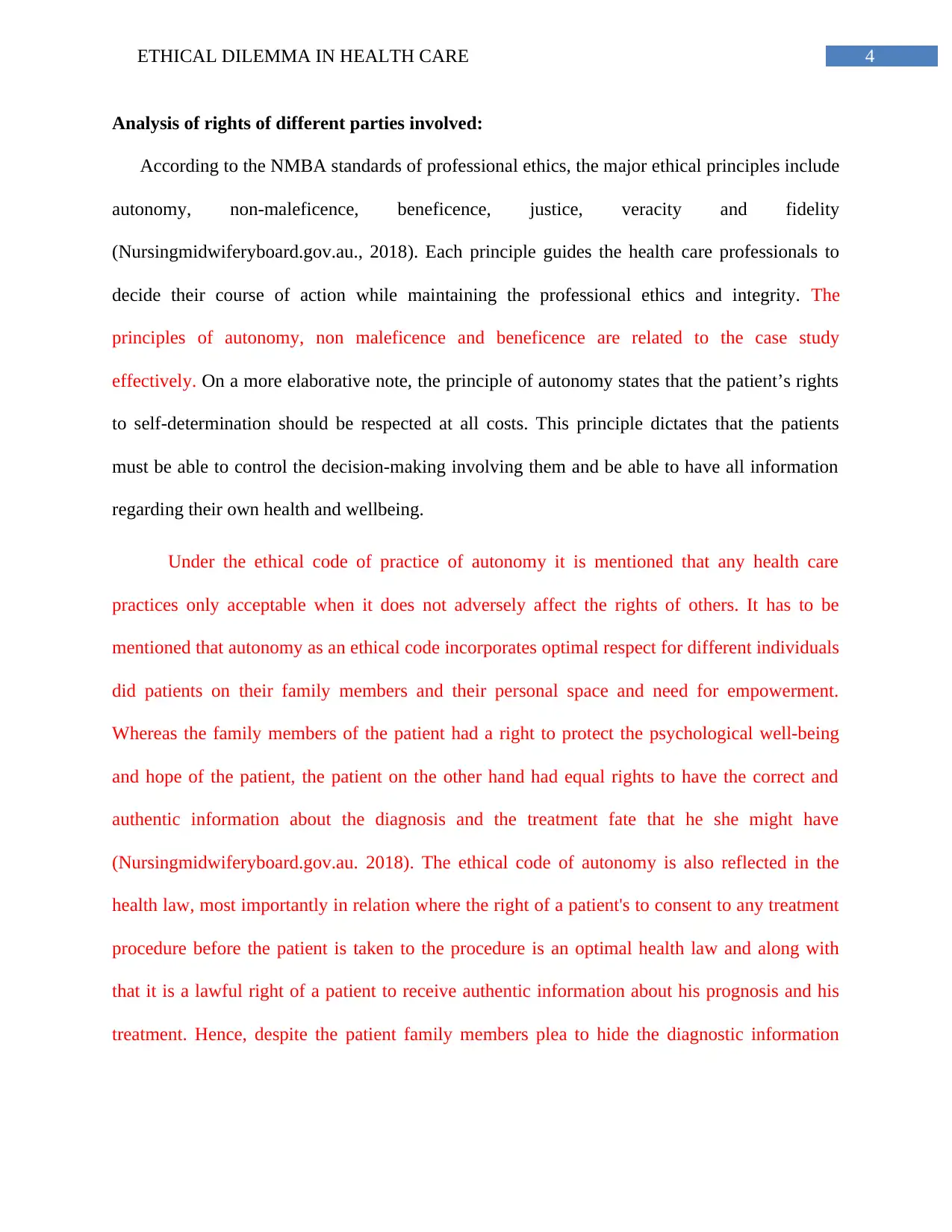
4ETHICAL DILEMMA IN HEALTH CARE
Analysis of rights of different parties involved:
According to the NMBA standards of professional ethics, the major ethical principles include
autonomy, non-maleficence, beneficence, justice, veracity and fidelity
(Nursingmidwiferyboard.gov.au., 2018). Each principle guides the health care professionals to
decide their course of action while maintaining the professional ethics and integrity. The
principles of autonomy, non maleficence and beneficence are related to the case study
effectively. On a more elaborative note, the principle of autonomy states that the patient’s rights
to self-determination should be respected at all costs. This principle dictates that the patients
must be able to control the decision-making involving them and be able to have all information
regarding their own health and wellbeing.
Under the ethical code of practice of autonomy it is mentioned that any health care
practices only acceptable when it does not adversely affect the rights of others. It has to be
mentioned that autonomy as an ethical code incorporates optimal respect for different individuals
did patients on their family members and their personal space and need for empowerment.
Whereas the family members of the patient had a right to protect the psychological well-being
and hope of the patient, the patient on the other hand had equal rights to have the correct and
authentic information about the diagnosis and the treatment fate that he she might have
(Nursingmidwiferyboard.gov.au. 2018). The ethical code of autonomy is also reflected in the
health law, most importantly in relation where the right of a patient's to consent to any treatment
procedure before the patient is taken to the procedure is an optimal health law and along with
that it is a lawful right of a patient to receive authentic information about his prognosis and his
treatment. Hence, despite the patient family members plea to hide the diagnostic information
Analysis of rights of different parties involved:
According to the NMBA standards of professional ethics, the major ethical principles include
autonomy, non-maleficence, beneficence, justice, veracity and fidelity
(Nursingmidwiferyboard.gov.au., 2018). Each principle guides the health care professionals to
decide their course of action while maintaining the professional ethics and integrity. The
principles of autonomy, non maleficence and beneficence are related to the case study
effectively. On a more elaborative note, the principle of autonomy states that the patient’s rights
to self-determination should be respected at all costs. This principle dictates that the patients
must be able to control the decision-making involving them and be able to have all information
regarding their own health and wellbeing.
Under the ethical code of practice of autonomy it is mentioned that any health care
practices only acceptable when it does not adversely affect the rights of others. It has to be
mentioned that autonomy as an ethical code incorporates optimal respect for different individuals
did patients on their family members and their personal space and need for empowerment.
Whereas the family members of the patient had a right to protect the psychological well-being
and hope of the patient, the patient on the other hand had equal rights to have the correct and
authentic information about the diagnosis and the treatment fate that he she might have
(Nursingmidwiferyboard.gov.au. 2018). The ethical code of autonomy is also reflected in the
health law, most importantly in relation where the right of a patient's to consent to any treatment
procedure before the patient is taken to the procedure is an optimal health law and along with
that it is a lawful right of a patient to receive authentic information about his prognosis and his
treatment. Hence, despite the patient family members plea to hide the diagnostic information
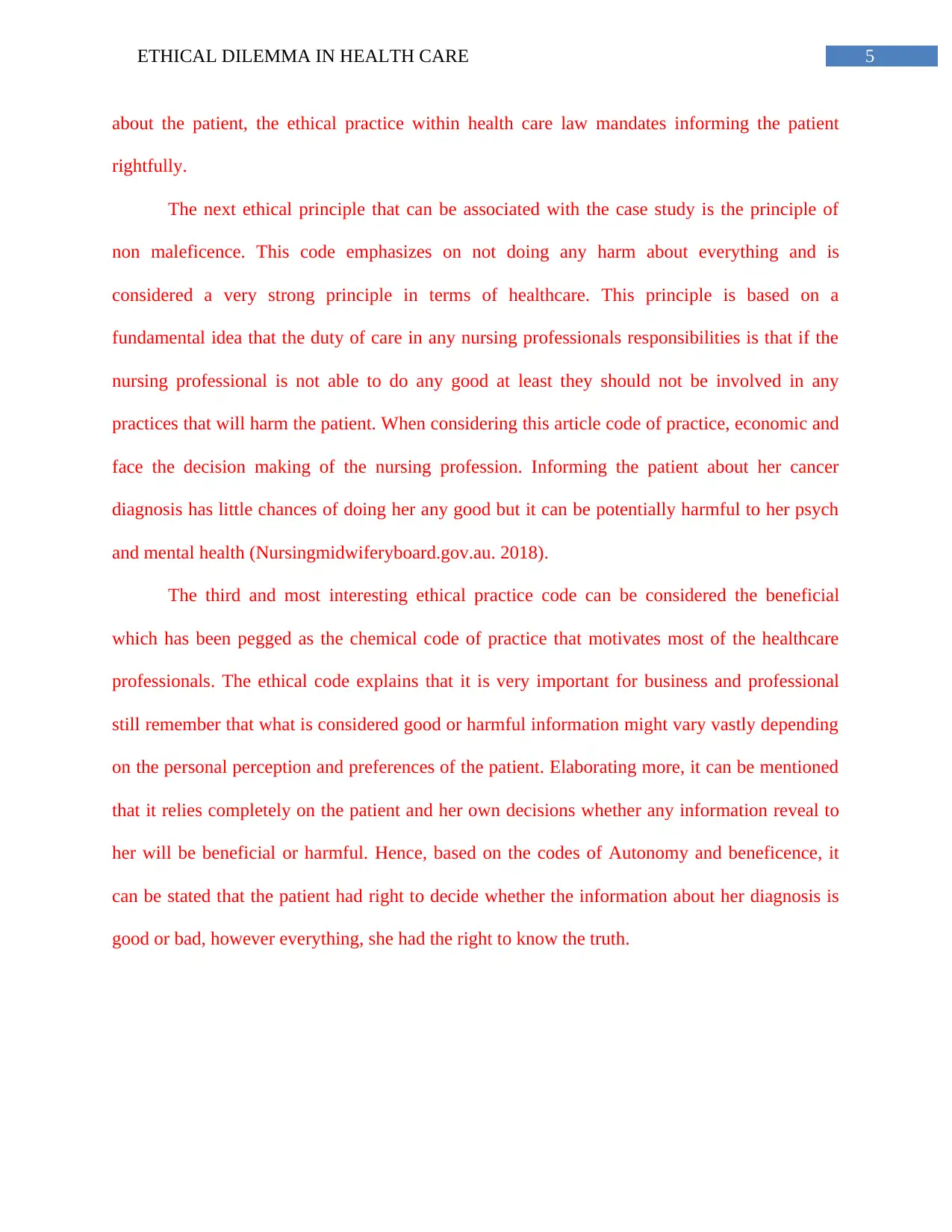
5ETHICAL DILEMMA IN HEALTH CARE
about the patient, the ethical practice within health care law mandates informing the patient
rightfully.
The next ethical principle that can be associated with the case study is the principle of
non maleficence. This code emphasizes on not doing any harm about everything and is
considered a very strong principle in terms of healthcare. This principle is based on a
fundamental idea that the duty of care in any nursing professionals responsibilities is that if the
nursing professional is not able to do any good at least they should not be involved in any
practices that will harm the patient. When considering this article code of practice, economic and
face the decision making of the nursing profession. Informing the patient about her cancer
diagnosis has little chances of doing her any good but it can be potentially harmful to her psych
and mental health (Nursingmidwiferyboard.gov.au. 2018).
The third and most interesting ethical practice code can be considered the beneficial
which has been pegged as the chemical code of practice that motivates most of the healthcare
professionals. The ethical code explains that it is very important for business and professional
still remember that what is considered good or harmful information might vary vastly depending
on the personal perception and preferences of the patient. Elaborating more, it can be mentioned
that it relies completely on the patient and her own decisions whether any information reveal to
her will be beneficial or harmful. Hence, based on the codes of Autonomy and beneficence, it
can be stated that the patient had right to decide whether the information about her diagnosis is
good or bad, however everything, she had the right to know the truth.
about the patient, the ethical practice within health care law mandates informing the patient
rightfully.
The next ethical principle that can be associated with the case study is the principle of
non maleficence. This code emphasizes on not doing any harm about everything and is
considered a very strong principle in terms of healthcare. This principle is based on a
fundamental idea that the duty of care in any nursing professionals responsibilities is that if the
nursing professional is not able to do any good at least they should not be involved in any
practices that will harm the patient. When considering this article code of practice, economic and
face the decision making of the nursing profession. Informing the patient about her cancer
diagnosis has little chances of doing her any good but it can be potentially harmful to her psych
and mental health (Nursingmidwiferyboard.gov.au. 2018).
The third and most interesting ethical practice code can be considered the beneficial
which has been pegged as the chemical code of practice that motivates most of the healthcare
professionals. The ethical code explains that it is very important for business and professional
still remember that what is considered good or harmful information might vary vastly depending
on the personal perception and preferences of the patient. Elaborating more, it can be mentioned
that it relies completely on the patient and her own decisions whether any information reveal to
her will be beneficial or harmful. Hence, based on the codes of Autonomy and beneficence, it
can be stated that the patient had right to decide whether the information about her diagnosis is
good or bad, however everything, she had the right to know the truth.
⊘ This is a preview!⊘
Do you want full access?
Subscribe today to unlock all pages.

Trusted by 1+ million students worldwide
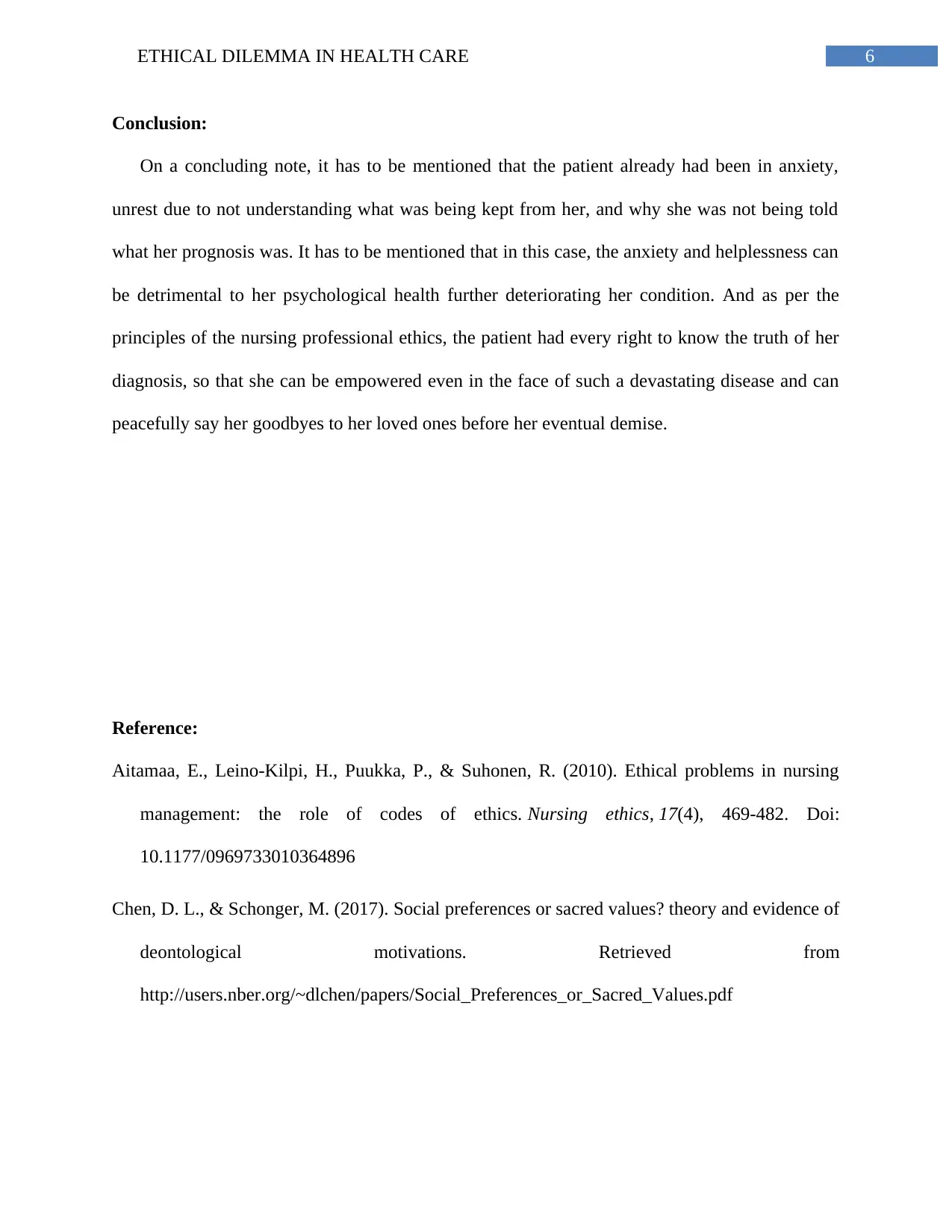
6ETHICAL DILEMMA IN HEALTH CARE
Conclusion:
On a concluding note, it has to be mentioned that the patient already had been in anxiety,
unrest due to not understanding what was being kept from her, and why she was not being told
what her prognosis was. It has to be mentioned that in this case, the anxiety and helplessness can
be detrimental to her psychological health further deteriorating her condition. And as per the
principles of the nursing professional ethics, the patient had every right to know the truth of her
diagnosis, so that she can be empowered even in the face of such a devastating disease and can
peacefully say her goodbyes to her loved ones before her eventual demise.
Reference:
Aitamaa, E., Leino-Kilpi, H., Puukka, P., & Suhonen, R. (2010). Ethical problems in nursing
management: the role of codes of ethics. Nursing ethics, 17(4), 469-482. Doi:
10.1177/0969733010364896
Chen, D. L., & Schonger, M. (2017). Social preferences or sacred values? theory and evidence of
deontological motivations. Retrieved from
http://users.nber.org/~dlchen/papers/Social_Preferences_or_Sacred_Values.pdf
Conclusion:
On a concluding note, it has to be mentioned that the patient already had been in anxiety,
unrest due to not understanding what was being kept from her, and why she was not being told
what her prognosis was. It has to be mentioned that in this case, the anxiety and helplessness can
be detrimental to her psychological health further deteriorating her condition. And as per the
principles of the nursing professional ethics, the patient had every right to know the truth of her
diagnosis, so that she can be empowered even in the face of such a devastating disease and can
peacefully say her goodbyes to her loved ones before her eventual demise.
Reference:
Aitamaa, E., Leino-Kilpi, H., Puukka, P., & Suhonen, R. (2010). Ethical problems in nursing
management: the role of codes of ethics. Nursing ethics, 17(4), 469-482. Doi:
10.1177/0969733010364896
Chen, D. L., & Schonger, M. (2017). Social preferences or sacred values? theory and evidence of
deontological motivations. Retrieved from
http://users.nber.org/~dlchen/papers/Social_Preferences_or_Sacred_Values.pdf
Paraphrase This Document
Need a fresh take? Get an instant paraphrase of this document with our AI Paraphraser
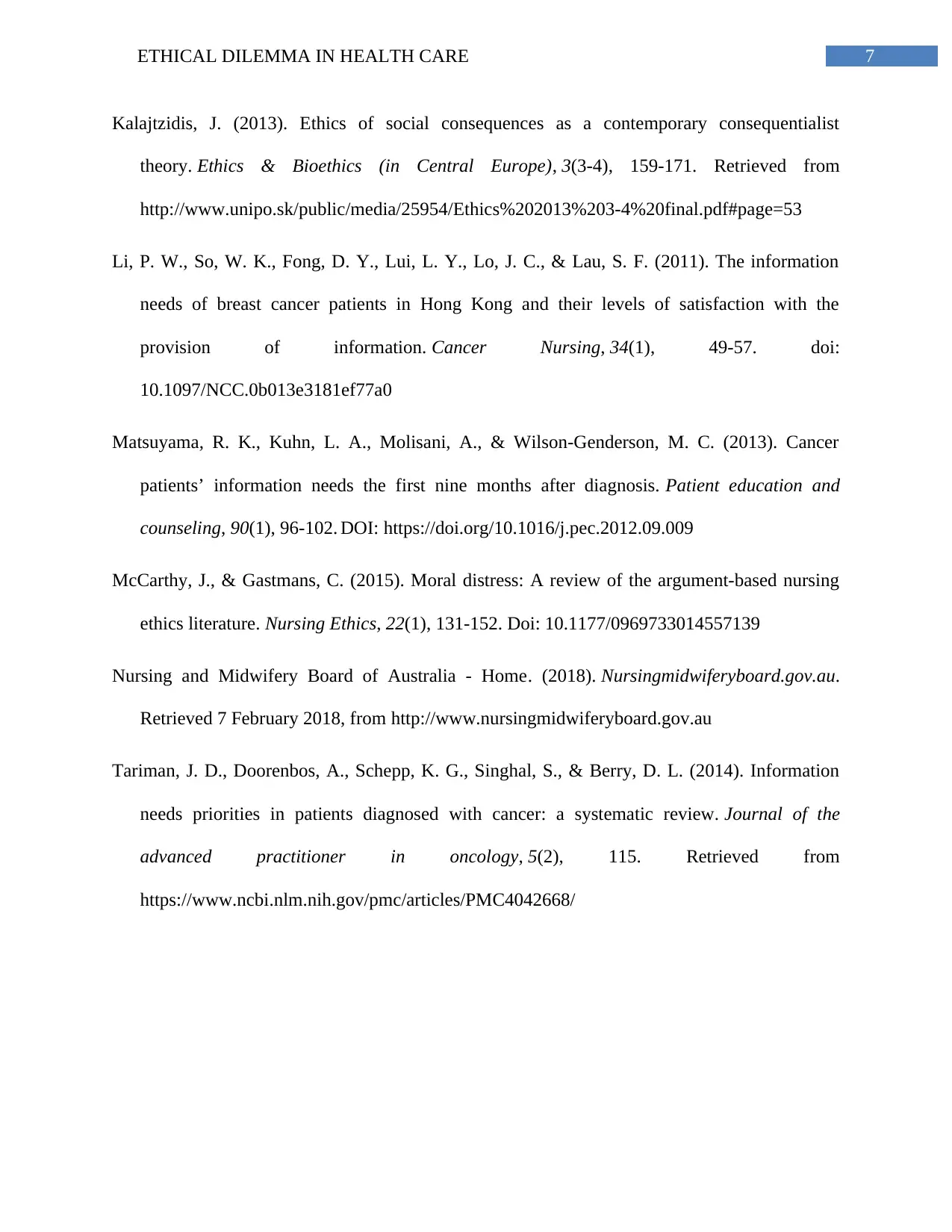
7ETHICAL DILEMMA IN HEALTH CARE
Kalajtzidis, J. (2013). Ethics of social consequences as a contemporary consequentialist
theory. Ethics & Bioethics (in Central Europe), 3(3-4), 159-171. Retrieved from
http://www.unipo.sk/public/media/25954/Ethics%202013%203-4%20final.pdf#page=53
Li, P. W., So, W. K., Fong, D. Y., Lui, L. Y., Lo, J. C., & Lau, S. F. (2011). The information
needs of breast cancer patients in Hong Kong and their levels of satisfaction with the
provision of information. Cancer Nursing, 34(1), 49-57. doi:
10.1097/NCC.0b013e3181ef77a0
Matsuyama, R. K., Kuhn, L. A., Molisani, A., & Wilson-Genderson, M. C. (2013). Cancer
patients’ information needs the first nine months after diagnosis. Patient education and
counseling, 90(1), 96-102. DOI: https://doi.org/10.1016/j.pec.2012.09.009
McCarthy, J., & Gastmans, C. (2015). Moral distress: A review of the argument-based nursing
ethics literature. Nursing Ethics, 22(1), 131-152. Doi: 10.1177/0969733014557139
Nursing and Midwifery Board of Australia - Home. (2018). Nursingmidwiferyboard.gov.au.
Retrieved 7 February 2018, from http://www.nursingmidwiferyboard.gov.au
Tariman, J. D., Doorenbos, A., Schepp, K. G., Singhal, S., & Berry, D. L. (2014). Information
needs priorities in patients diagnosed with cancer: a systematic review. Journal of the
advanced practitioner in oncology, 5(2), 115. Retrieved from
https://www.ncbi.nlm.nih.gov/pmc/articles/PMC4042668/
Kalajtzidis, J. (2013). Ethics of social consequences as a contemporary consequentialist
theory. Ethics & Bioethics (in Central Europe), 3(3-4), 159-171. Retrieved from
http://www.unipo.sk/public/media/25954/Ethics%202013%203-4%20final.pdf#page=53
Li, P. W., So, W. K., Fong, D. Y., Lui, L. Y., Lo, J. C., & Lau, S. F. (2011). The information
needs of breast cancer patients in Hong Kong and their levels of satisfaction with the
provision of information. Cancer Nursing, 34(1), 49-57. doi:
10.1097/NCC.0b013e3181ef77a0
Matsuyama, R. K., Kuhn, L. A., Molisani, A., & Wilson-Genderson, M. C. (2013). Cancer
patients’ information needs the first nine months after diagnosis. Patient education and
counseling, 90(1), 96-102. DOI: https://doi.org/10.1016/j.pec.2012.09.009
McCarthy, J., & Gastmans, C. (2015). Moral distress: A review of the argument-based nursing
ethics literature. Nursing Ethics, 22(1), 131-152. Doi: 10.1177/0969733014557139
Nursing and Midwifery Board of Australia - Home. (2018). Nursingmidwiferyboard.gov.au.
Retrieved 7 February 2018, from http://www.nursingmidwiferyboard.gov.au
Tariman, J. D., Doorenbos, A., Schepp, K. G., Singhal, S., & Berry, D. L. (2014). Information
needs priorities in patients diagnosed with cancer: a systematic review. Journal of the
advanced practitioner in oncology, 5(2), 115. Retrieved from
https://www.ncbi.nlm.nih.gov/pmc/articles/PMC4042668/
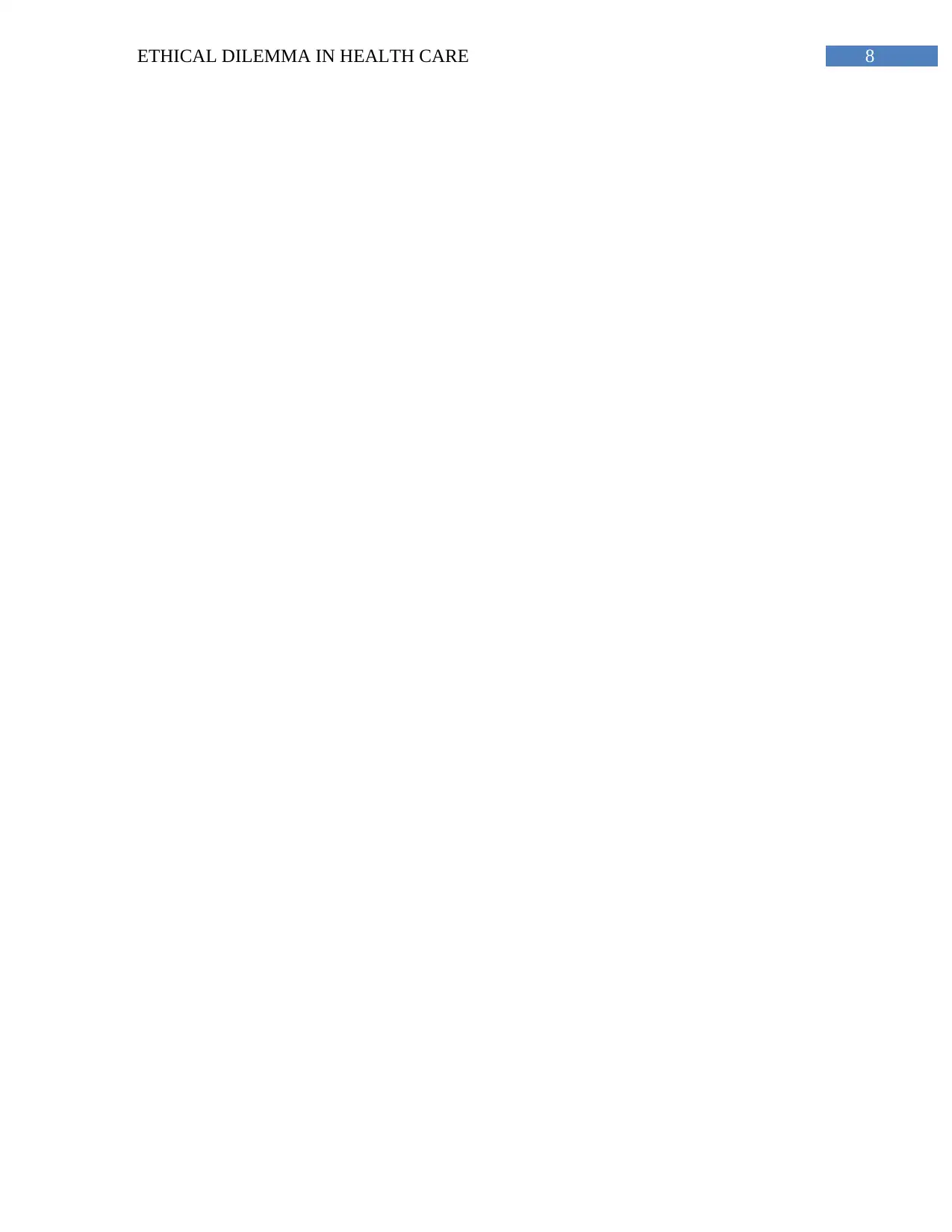
8ETHICAL DILEMMA IN HEALTH CARE
⊘ This is a preview!⊘
Do you want full access?
Subscribe today to unlock all pages.

Trusted by 1+ million students worldwide
1 out of 9
Related Documents
Your All-in-One AI-Powered Toolkit for Academic Success.
+13062052269
info@desklib.com
Available 24*7 on WhatsApp / Email
![[object Object]](/_next/static/media/star-bottom.7253800d.svg)
Unlock your academic potential
Copyright © 2020–2026 A2Z Services. All Rights Reserved. Developed and managed by ZUCOL.





